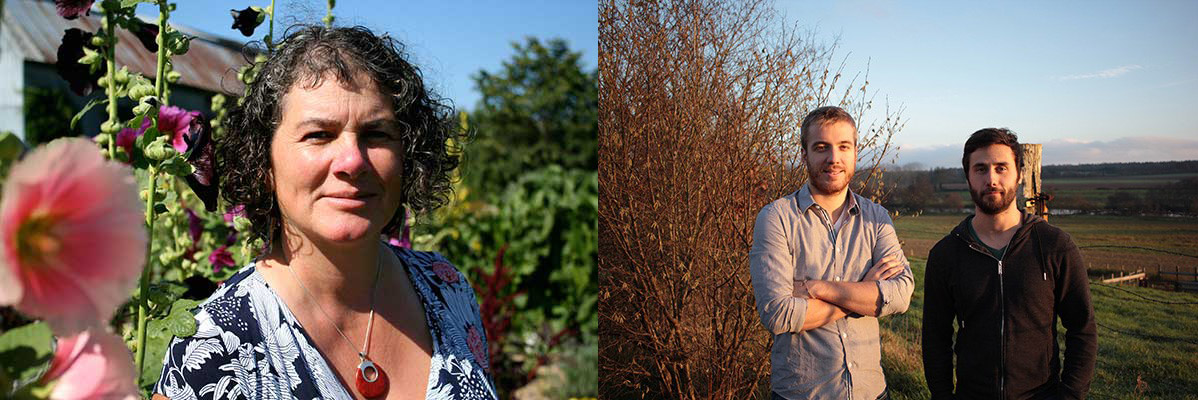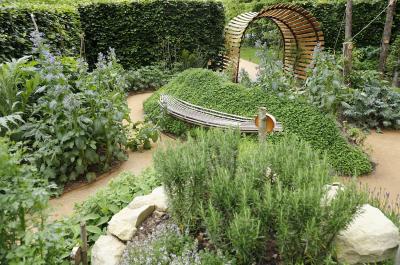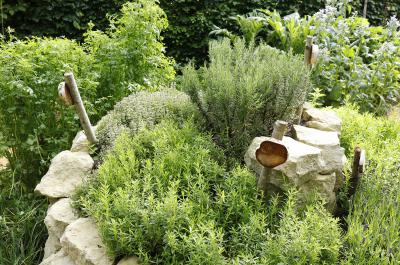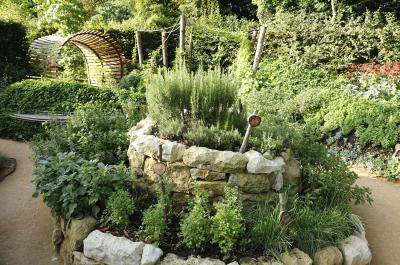11. LE JARDIN QUI SE SAVOURE
"FLEURS, FRUITS, FEUILLES, MANGEZ-LES TOUS !"
With more than 10 billion humans forecast on Earth by 2100, producing enough food for everyone as close as possible to the place it will be consumed – i.e. the City for more than half the world's population – is a major challenge for the coming century. The ornamental garden that graces urban settings as somewhere to walk, relax and take time out must therefore become a sustenance garden.
DESIGNERS
Guillaume POPINEAU and David TRIGOLET, landscape engineers, and Chantal DUFOUR, herbalist
FRANCE

From left to right: Chantal Dufour, Guillaume Popineau and David Triolet
With the plant world holding an ongoing fascination for him, David Trigolet began his higher education pathway by taking a two-year diploma in Horticultural Production at Le Fresnes sixth-form college in Sainte-Gemmes-sur-Loire. He followed this up with a degree at Angers National Institute of Horticulture and Landscape, graduating in 2011 as a landscape engineer. He soon set about working freelance for various design offices, before joining a landscape firm in-house in 2012. In this firm, David Trigolet busied himself primarily with design and oversight during project management. With each project he undertook, sustainable development, ecology, biodiversity and respect for the environment became ever more important features in his eyes, and this is why he decided to take up edible landscape planning, which involves combining the aesthetic values of a landscaped space with the productive aspect of a vegetable garden. The latter thus becomes a harmonious living environment where what tastes nice also looks nice ... and vice-versa! In 2015, he founded Potag’Home, an edible landscape planning and urban agriculture firm in the Pays de la Loire region. This firm seeks to bring the possibility of growing and eating truly healthy vegetables within everyone's reach - in the city and countryside alike - in their garden, their balcony, their terrace and even on their roof, teaching them how plants function and interact with their environment. Through his convictions, David hopes to be able to educate people in the importance of respecting soil, biodiversity, the plant and animal world and, more generally, the environment at large. Eating local and healthy is a key aspect for him if the values he holds so dear are to be respected.
Chantal Dufour has been a herbalist-therapist since 1999. Since 1996, she has owned "ViV-Herbes", an independent herbalist's shop where the cultivation, picking, processing and drying of medicinal plants, herbs and edible flowers are carried out in Lejeune, Quebec. For almost twenty years now, her life has revolved around health and the diverse uses that can be made of plants. In addition to having designed over 70 plant-based products, she gives therapeutic consultations and teaches the public through an array of programmes and lectures by request. In 2009, she worked closely with New Brunswick Botanical Garden on laying out a herbalist's pavilion and garden where, through short training sessions on plants' wide-ranging uses (for cooking, cosmetics and therapy), she has been sharing her knowledge and passion weekly every summer.
Guillaume Popineau has loved gardening and nature ever since he was a boy, and enrolled in Angers National Institute of Horticulture and Landscape in 2006. A university exchange spanning several months with the Planning Faculty at the University of Montreal sparked an interest in spatial design, and gave him the chance to set off in discovery of Canadian landscapes. In 2011, as part of his final year dissertation, he worked on urban wasteland and its conversion through phytoremediation, and graduated as a landscape engineer specialising in project management and engineering. Guillaume went on to join the Atelier Paysage et Lumière team, a lighting design and landscape firm in Paris. As project manager, he developed his skills bearing on design of urban spaces and their lighting, in urban planning and project oversight. For more than three years, he worked on myriad projects at varied scales, ranging from developing the entrances to Auteuil Racecourse to urban renovation projects in Dieppe or Bagnolet. In contact with Dominique Hernandez, he set the participatory approach and dialogue at the centre of the landscape project design process. In 2013, he developed an interest in alternative agricultural production systems, particularly in cities. This led him to decide, in June 2015, to head to Montreal, considered to be the world capital of urban agriculture, where he crossed paths with "healthy and local eating" stakeholders in Quebec. Over several months spent volunteering, doing placements on organic holdings, taking part in an Agroecology training programme and urban agriculture summer school organised by the University of Quebec in Montreal, he amassed extensive knowledge on agricultural production in cities and edible landscape developments.


